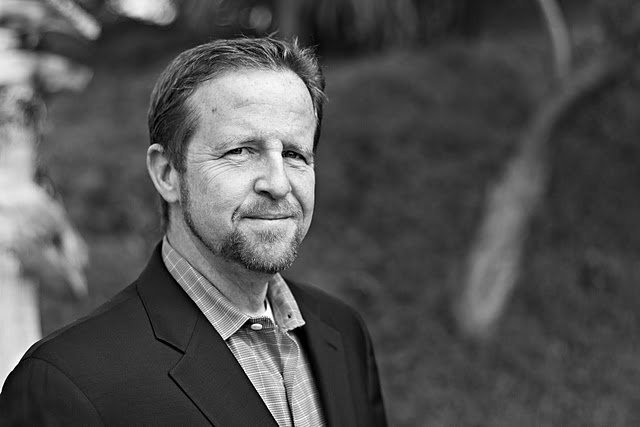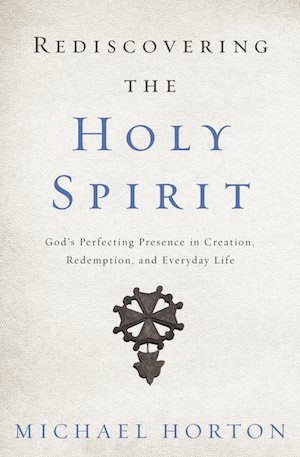
This sponsored post was prepared by Michael Horton, author of over thirty books, including the just-released Rediscovering the Holy Spirit.
Many of us still remember the “Holy Ghost” from the old King James Version. For most modern people, a ghost is associated more with All Hallows’ Eve (a.k.a. Halloween) than with Pentecost Sunday. Especially in our age, the Holy Spirit is regarded (when taken seriously at all) as the “spooky” member of the Trinity. If you’re into that sort of thing—the paranormal and sensational—then the Holy Spirit is for you.
Who exactly is the mysterious third person of the Trinity? Why does he seem to possess less reality than the Father and the Son? Perhaps we think of the Holy Spirit as a divine force or energy that we can “plug into” for spiritual power. Or as the kinder and gentler—more intimate—side of God. But a person—in fact, a distinct person of the Godhead?
I want to challenge this association of the Spirit merely with the extraordinary.
This is unfortunate all around, because it distinguishes his work too sharply from that of the Father and the Son and also because it distracts us from the vast range of his activity in our world and in our lives. On both sides of the Pentecostal divide, we too easily treat the Holy Spirit as a placeholder for the “extra” things in Christianity. Sure, we have the Father and the Son, but we also need the Holy Spirit. You may be redeemed, but have you been baptized in the Spirit? The Word is vital, but we must not forget the Spirit. Doctrine is important, but there is also experience.
Consequently, the Spirit becomes typecast into predictable roles—mostly cameo appearances, especially from the book of Acts—that provoke debates over whether we should expect the same signs and wonders today. We think of him when we are talking about regeneration and sanctification and when we are arguing about his more controversial gifts. Otherwise, he is out of sight and out of mind.
The Holy Spirit is the easiest person of the Godhead to depersonalize—and not only because of cultural forces. One might even say that, for the Spirit, being somewhat forgotten is an occupational hazard. Some of our confusion about the Holy Spirit arises from a distortion of genuinely biblical truths. Here are four ways in which we can go wrong.
First, we must remember that God is an incomprehensible mystery. He has revealed enough about himself for us to apprehend him in faith, but we do not know his inner essence. Even the term “person” in Trinitarian discussions is used analogically and anthropomorphically. The subsistences of the Godhead are not persons in the way that three human beings are persons, with separate centers of consciousness, wills, and so forth. Scripture provides us with sufficient revelation of the Spirit’s identity and mission, but it is often difficult for us to remain within these bounds.
 Second, even when we embrace the incomprehensible revelation of God as Trinity, it is not easy to connect the Holy Spirit to our experience. We know what a Father-Son relation is in human terms, but where does the Spirit fit? Mary has sometimes been given something close to the status of the third person in popular Roman Catholic piety. Some recent theologians have even referred to the Spirit as Mother to make the triad more resonant with our familial experience. However, this move lacks exegetical foundation. Even if the Spirit is likened to a mother or a hen in a few verses, this is in the Spirit’s relation to creation, not within the immanent Godhead. We simply do not have many passages about the Spirit’s role in the immanent Trinity. Even in John’s Gospel where we find the bulk of our Lord’s teaching about the Spirit, the emphasis falls on the relation of Jesus as eternal Son to his Father. Nevertheless, we have a great deal of revelation concerning the Spirit’s mission in the economy of creation and redemption.
Second, even when we embrace the incomprehensible revelation of God as Trinity, it is not easy to connect the Holy Spirit to our experience. We know what a Father-Son relation is in human terms, but where does the Spirit fit? Mary has sometimes been given something close to the status of the third person in popular Roman Catholic piety. Some recent theologians have even referred to the Spirit as Mother to make the triad more resonant with our familial experience. However, this move lacks exegetical foundation. Even if the Spirit is likened to a mother or a hen in a few verses, this is in the Spirit’s relation to creation, not within the immanent Godhead. We simply do not have many passages about the Spirit’s role in the immanent Trinity. Even in John’s Gospel where we find the bulk of our Lord’s teaching about the Spirit, the emphasis falls on the relation of Jesus as eternal Son to his Father. Nevertheless, we have a great deal of revelation concerning the Spirit’s mission in the economy of creation and redemption.
Third, the Holy Spirit is so actively involved in our lives, subjectively, that we can take his presence for granted or identify him with our own inner self. Domesticating the Spirit to an individualistic mysticism, the Holy Spirit becomes one’s inmost voice. But again, this is a distortion of a truth. The Holy Spirit is the person who works within us, even to the point of indwelling us and interceding in our hearts. But the Holy Spirit is not our spirit, and his voice is not to be confused with our own. The Spirit is a divine person within us, not a divine part of us.
Fourth, from a proper focus on Christ we may improperly infer that the Holy Spirit has a minor part in the biblical drama. As in the other dangers, this error is a distortion of the truth rather than an outright contradiction of it. After all, Jesus taught us to read Scripture with himself at the center (Luke 24:25–27; John 5:39). Jesus himself taught us that the Spirit “will bear witness about me” (John 15:26 ESV; cf. 16:14–15). J. I. Packer compares the Holy Spirit to a spotlight that illumines a glorious cathedral at night. One does not stare into the light but beholds the Savior by that light. You can therefore be sure where the Spirit is active: wherever Jesus Christ is held up as the Savior of sinners. Even when we turn the spotlight on the Spirit, we find him engaged always in something related to Christ.
For all of these reasons and more, we need to take a step back every now and again to focus on the Spirit himself—his person and work—in order to recognize him as someone other than Jesus or ourselves, much less something, such as a divine power or resource. We need to explore the vast territory of the Spirit’s operations. And then, hopefully, we obtain by this contemplation a fresh dependence on the Holy Spirit in every area of our lives.
Michael Horton is the host of White Horse Inn, a nation-wide radio broadcast. He is J. Gresham Machen Professor of Systematic Theology and Apologetics at Westminster Seminary California and the editor in chief of Modern Reformation magazine. His new book is Rediscovering the Holy Spirit.










